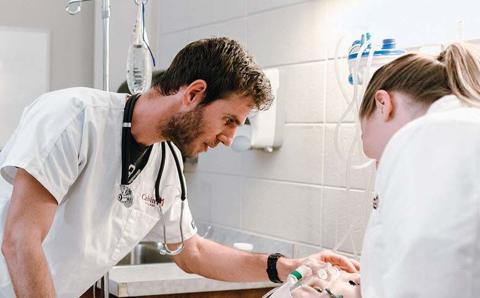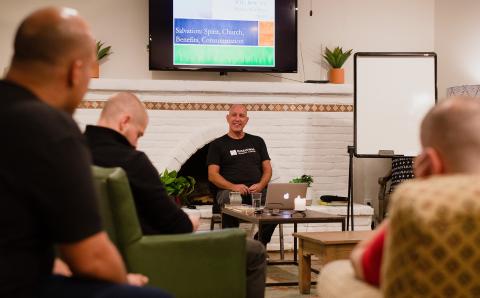Twenty-four years ago my wife and I were aspiring young pastor candidates who felt a call to mission ministry but were not clear about where or what that meant. We knew that sharing our hope in Jesus Christ with nonbelievers was part of the call, but I had introverted tendencies at that age and found the prospect quite intimidating. Thankfully, I benefited from several mentors who helped me develop confidence in what God was doing in me and comfort in sharing my personal faith story.
Most Christian Reformed folks are like me. As a group, we tend to be fairly knowledgeable about the doctrines we learned in catechism class and through Christian education, yet we find it difficult to share our personal hope in Jesus Christ.
Every year, our CRCNA communications team sends a survey to a cohort of CRC congregations. Each congregation encourages members to complete the survey, and when the results are tallied, a predictable trendline emerges.
Every year, only a third of respondents claim that it is “definitely” or “mostly” true that they regularly talk to others about their spiritual lives. This question is one of the lowest-rated questions every year. I suspect this is one reason our statistics (and our personal experiences) indicate that adult baptisms of new believers are rare in many of our churches. If you are interested in learning more, please take a look at our Yearbook statistics and the results of our denominational survey.
How do we become more comfortable talking about our faith and doing evangelism? First, we acknowledge that it is the gospel of Jesus Christ and the mysterious work of the Holy Spirit that saves those whom God chooses (Eph. 1:3-14; Heidelberg Catechism Q&A 21). It’s not— and never will be— the result of a confident and polished presentation.
However, we also acknowledge that confessing this is not an excuse to neglect our witness. Rather, it is a comfort knowing that in evangelism God is the primary actor and we simply cooperate with the Holy Spirit. Instead of hanging back, Reformed believers can share their faith liberally and joyfully, knowing that in Christ seeds have already been sown.
Second, we realize that personal relationships are the primary vehicles of gospel communication. God can use apparent coincidences and providential appointments to bring people to faith, but more often God works through the obedient and intentional efforts of believers to lay claim to the lost and hurting.
During the early days of the church, the most effective gospel witness happened when Christians cared for the sick, gave food to the poor, and rescued abandoned infants (see The Patient Ferment of the Early Church, by Alan Kreider). Today, the most fruitful witness often happens over a cup of coffee, a cancer diagnosis, or a lunchroom conversation with a confused coworker.
As I think about what I learned from my mentors about how to be a better witness, two words stand out: love and practice. Love for nonbelievers drives us to build relationships and attend to conversations. Practice at sharing our faith stories and a few special Bible verses helps us feel more comfortable. God will do the rest in God’s time.
About the Author
Rev. Zachary King is the general secretary of the CRCNA. He is a member of Cascade Fellowship Christian Reformed Church in Grand Rapids, Mich.









